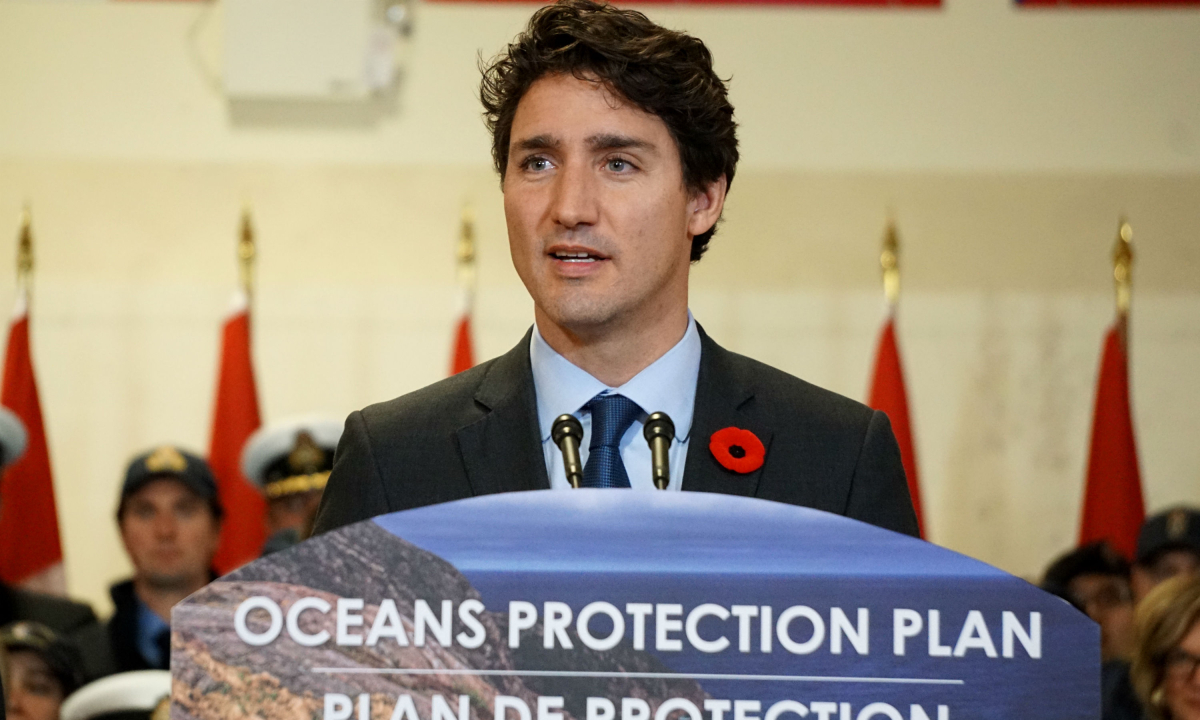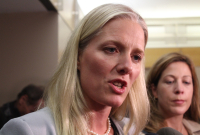Support strong Canadian climate journalism for 2025
The Trudeau government introduced a plan to put its stamp on Canadian environment and energy laws in Ottawa on Thursday as it tabled a mammoth omnibus bill in Parliament.
The 341-page bill proposes to scrap two major regulatory agencies and replace them with revamped federal organizations.
Justin Trudeau's Liberals, which had pledged in the 2015 election to undo a series of controversial changes adopted by the former Harper government in 2012, described the new legislation as part of a larger plan to restore public trust in federal oversight of major industrial projects. The bill includes the introduction of a brand new Impact Assessment Agency to centralize federal evaluations of major projects, as well as a new Canadian Energy Regulator to oversee the nation's interprovincial and international pipelines and powerlines.
These would replace the Canadian Environmental Assessment Agency as well as the National Energy Board.
The government said that it was hoping the legislation would create a new "early engagement" environmental assessment regime that would help it avoid the deluge of court cases and protests over pipelines and hydro dams that have cropped up in recent years, paralyzing or in some cases terminating major projects such as TransCanada's recently-cancelled Energy East pipeline and Kinder Morgan's Trans Mountain pipeline expansion project.
The new legislation proposes to keep a controversial change, introduced by the previous government, that leaves final decisions on major projects in the hands of the minister or cabinet. But Environment and Climate Change Minister Catherine McKenna said the legislation, Bill C-69, contains important new measures to strengthen environmental protection and Indigenous participation.
"We believe we've built a much better system," said McKenna, as she announced details of the bill to reporters. "We need to show the world that we will protect the environment, and that we will attract investment.”
Pressed on pipeline controversies at the announcement, McKenna said the new system would have still resulted in a green light for Kinder Morgan’s controversial Trans Mountain pipeline expansion.

National Energy Board becomes Canadian Energy Regulator
The Liberal omnibus bill is the answer to a 2012 omnibus bill during the government of former prime minister Stephen Harper. It made radical changes to federal environmental law, and repealed a number of protection measures for waterways, fisheries and other areas.
Prime Minister Justin Trudeau campaigned in 2015 on a promise to review Canada’s environmental assessment processes, replace environmental protections scrapped by his predecessor, and restore public trust in the country's National Energy Board, which had long been criticized for being ineffective and too cozy with the pipeline industry it was mandated to regulate.
After 14 months of consultations, the Trudeau government released Thursday's bill that makes a number of transformative changes.
Not only will environmental concerns be taken into account, the bill states, but social, health, Indigenous, economic, employment and gender issues as well.
Explaining the decisions on Feb. 8, McKenna said Canadians had become concerned that federal reviews of projects had become too politicized. "Canadians want a modern environmental and regulatory system" with a "clear, predictable and timely process,” she said.
If the bill becomes law, the new Impact Assessment Agency of Canada will lead all federal reviews of major projects, and work alongside other bodies like the new Canadian Energy Regulator.
The latter regulator, like its predecessor, will still be headquartered in Calgary, contrary to the recommendations of an independent review panel. The government says it will be subject to new “independence” and “accountability” measures, and have new “informal” mechanisms to engage public participation. The new energy regulator would also prevent its chief executive officer from participating in regulatory decisions, as was the case with the NEB, by preventing them from serving on the board of directors or as a commissioner.
The new legislation also removes a requirement that currently forces permanent members of the energy regulator to reside in Calgary, which is the Canadian home of a number of major oil and gas industry headquarters. It also has requirements for the government to ensure that there is Indigenous representation on the board of directors as well as ensuring there is at least one Indigenous commissioner.
The government says it is also creating new spaces for Indigenous jurisdictions to be involved in project reviews, and for scientific data to be vetted by federal scientists and made publicly available in an easy-to-understand format.
Lawyers with West Coast Environmental Law Association said the new legislation helps restore public trust in environmental decision-making, but is far from perfect.
“Replacing the National Energy Board with the new Canadian Energy Regulator addresses some, but not all of the issues of regulatory capture,” said staff lawyer Eugene Kung. “The tabled legislation has not implemented all of the recommendations of the NEB modernization panel to separate oil and state.”

Government to consult on project list
The federal government is still deciding what kinds of resource development projects will qualify to be put through the new impact assessment process proposed by Bill C-69, currently at first reading in the House of Commons.
The current assessment regime relies on a list of such project types. The list, called the Regulations Designating Physical Activities, was originally drawn up by the Harper government.
McKenna called that list a “grab bag” of projects based on political motives. She said the Trudeau government would be “seeking Canadians’ feedback” on how to make that list more “robust.”
For projects that the government considers large or complex — presumably significant oil pipelines — the minister will appoint a panel consisting of members from the assessment agency and the regulator.
That panel will compile a report and deliver it to cabinet, which will take the ultimate decision on whether projects can go ahead. The assessment agency will also staff a "secretariat" for the panels, officials said.
The new rules also require scientific and other information to be taken into account in impact assessments, and that this information be made publicly available through a registry available online.
Nichole Dusyk, postdoctoral fellow at the Pembina Institute, said the legislation proved the government took its consultations on environmental laws seriously.
"Today’s legislation improves the federal assessment process by centralizing authority for impact assessment under a single agency; providing a broader set of criteria for assessing projects including impacts to social and health outcomes; and removing the limitations on public participation that were put in place in 2012," said Dusyk in a statement.

Major final decisions in minister's hands
McKenna said the government is maintaining control over the final decision on major projects because it is ultimately responsible for decisions that impact Canadians at large.
“The government has the last word because we're responsible for Canadians,” said McKenna. "We have to [take decisions] in the national interest. Canadians expect that from us.”
The government is adding a segment to the beginning of project proposals called “early engagement,” where proponents must talk with concerned groups, such as Indigenous communities, before a formal assessment is launched.
This process doesn’t exist in the current assessment regime, federal deparmental officials said, and is designed to “limit polarization” or political dust-ups on major projects like pipelines.
"Smart proponents already do this," McKenna said. "The goal is really to identify concerns on the front end," so “a faster outcome on the back end" is possible.
At the press conference, McKenna fielded several questions on the government’s decision to continue to back the Trans Mountain pipeline expansion. Asked whether the new system would have resulted in a different outcome, she said it wouldn’t have.
“I think that you can expect that it would have been approved,” she said. “We are not doing anything different. We’re being consistent.”
She said the government had worked hard to rebuild Canadians’ trust through its Oceans Protection Plan, the national carbon pricing plan and today’s bill, and that the decision to approve Trans Mountain was made “in that context” and “we stand behind that decision.”
"We made that decision in the public interest,” she said. "I’m not getting dragged into a spat between British Columbia and Alberta.”

Federal Conservatives, Greens pan new legislation
Conservative Party environment critic Ed Fast and natural resources critic Shannon Stubbs said the bill introduces "new regulatory burdens" that won't actually enhance environmental protection.
In a statement, they said the bill "provides no assurances that future projects of national and local significance will proceed." The new early planning stage "provides the minister with the power to kill a project before it has been evaluated based on science," they argued.
“The Liberals must ensure that energy investors and proponents have confidence that their job-creating projects will be able to proceed in a timely manner and that projects won’t be delayed indefinitely by legal and bureaucratic roadblocks,” said Stubbs. “The Trudeau Liberals must champion Canadian energy projects and provide regulatory certainty, predictability, and clarity to ensure the viability of major projects.”
Meanwhile, the Green Party of Canada said it was "disappointed" by the government's failure to repair the Harper government's "serious damage" to environmental protections.
The new Liberal bill "ignores many of the recommendations from the government’s expert panels," the party said in a statement, and "breaks important election promises that helped bring the Liberals to power."
“This legislation should never have come forward as an omnibus bill,” said Green Party leader Elizabeth May, in the statement. “This is a bizarre hybrid — part Harper, part Trudeau — and totally inappropriate to the important task of restoring the environmental protections that we lost in 2012."
Editor's note: This article was updated at at 5:57 p.m. ET with additional background and details about the legislation.






Comments
This "overhaul" is window dressing. May is correct that previously ceded environmental protections lost with Harper's "omnibus" bill will likewise not be improved or regained with this one.
The perpetuation of the revolving door between industry and the regulator by any name, will continue to make any new regulatory body a shill for the industry, captured by industry, and for industry.
The Environment - plus ça change!
Let's see if it works: apply it to Kinder Morgan's Trans Mountain Pipeline.
I would like to see the National Observer dig deeper into this story. What are the recommendations of the government's 'experts panel' that are ignored in this bill?
That is an excellent question, and the answer could illuminate the issue.
If the new Canadian Energy regulator is anything like Albertas' energy regulator, we might give pause for some meaningful thinking. The Alberta Energy regulator is full of oil sycophants (former head of CAPP) and as such, is arms length from the government, but directly "in bed" with the oil industry. This makes me highly suspicious that the new Canadian Energy Regulator will be comprised of more of the same, especially if Resource Minister Jim Carr, lately a board member of the pro-oil lobbyist Fraser Institute (funded by the Koch brothers of Texas infamy) has any input. Clearly Mr. Carr is in conflict of interest, but what the heck, we don't really have any conflict of interest as long as we stay confused about what is in the "national interest" and what is the oil mafias' interest. Our politicians seem awfully confused about this as well. Time to set them straight!!
Would this new regime have asked the question ‘what is the best route and method to get Alberta’s bitumen to world markets’? If asked, the answer would almost certainly not be the Kinder Morgan pipeline for diluted bitumen. It might well have been sending undiluted bitumen to a port by rail in heated insulated tank cars; at very least this would have been considered.
Would this new regime have asked the question ‘what is the best route and method to get Alberta’s bitumen to world markets’? If asked, the answer would almost certainly not be the Kinder Morgan pipeline for diluted bitumen. It might well have been sending undiluted bitumen to a port by rail in heated insulated tank cars; at very least this would have been considered.
I thought we got rid of omnibus bills with the Harper Conservatives. Another reason to wish for a balanced government, as for example, via proportional representation. Oh, that's right; the Trudeau government is trying to suppress that as well ... (sigh!)
Will the senior staff of the National Energy Board be changed, or only the name?
Kind of like putting lipstick on a pig....same old same old.
Pucker up, and bend over!
Name change, lots of pages of words to keep some secretaries busy, huffing and puffing - it's the SAME OLD THING!! Economy trumps (!!) the Environment!
Canadians really need to GET POLITICAL - i.e. INVOLVED - and see how it is all related! Issues like electoral reform, environmental justice, taxation fairness, etc., all connect to the powerful few running the show! We're out of time! The LEAP Manifesto says it best!
Rachel Notley she has decided to play ball with the Federal Liberals !! Apparently some favourable climate accord deal was fashioned…which will soon be cast aside after the next Alberta election… ! Your best bet Premier is to encourage everyone to hear the common sense arguments for a new pipeline to the coast that could handle more dilbit with less risk !
https://www.vicnews.com/opinion/mp-report-defending-our-oceans/
Murray Rankin, MP Victoria “ .. took the PM at his word when saying ..the approval process(for the Trans Mountain Expansion(TMX)pipeline would be “redone”…Did not happen !
MP Rankin ..”My question to the Liberals is this: since when is breaking…. promises, accepting unscientific assessments and inadequate consultation , threatening …. orcas, and BC’s coastal environment ……. in the national interest?
The PM offered to mediate this pipelines issue whereupon he could direct tankers to more open waters !
The government’s recent Omnibus Bill C 69 criteria ,along with existing risk assessments of BC port locations(see attach.) and The West Coast Spill Response Study, by NUKA ) would leave the PM with one choice…namely Port Simpson !
Carl Shalansky, P. Eng. (Retired)
Blog: https://redfern3359.wordpress.com/
(604) 986-4657
“Replacing the National Energy Board with the new Canadian Energy Regulator addresses some, but not all of the issues of regulatory capture,” said staff lawyer Eugene Kung. “The tabled legislation has not implemented all of the recommendations of the NEB modernization panel to separate oil and state.”
What are the recommendations of the government's 'experts panel' that are ignored in this bill?